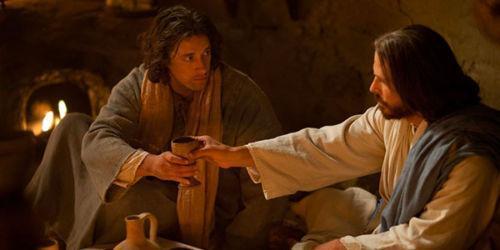
The Thickness of Blood in Family Business – PART 3
“The Dinner Party Changed Everything.”
This is part three of this three part series. It comes from a single essay. If you would like to go directly to the whole essay, please click here.
ABSTRACT
In this essay I am creating a terminology by which to illuminate the inclusion of non-family persons in the family business. The terms included are blood, water, wine, miracle and blessing.
In family business we often stand at crossroads. In these moments we seek guidance which, broadly speaking, comes from realms of the spiritual and of the empirical. Here, we focus on the spiritual.
The spiritual is fraught with associations that both draw in and repel depending upon who we are. I ask the readers to approach the material openly.
The crux of this essay is examining the old saying, “blood is thicker than water.” To do so we look at three scriptural texts. In each text, one of a trio of fluids is turned into another of the trio. The water of the Nile turns into blood, the water at the wedding at Cana turns into wine, and the wine at The Last Supper turns into blood.
This essay’s goal is to open us up in the daily practice of our family business to the possibility of a similar turn in how we see non-family; that beyond our blood relations there are worthy people who we do well to bring into our family business.
Managing those relationships respectfully yields great dividends.
This is part three of a three part series. It starts with some recap of parts one & two. To skip to the new material click here.
WATER TO WINE
In this essay I am creating a terminology by which to illuminate the inclusion of non-family persons in the family business. The terms are blood, water, wine, miracle and blessing.
- Blood is associated with the physical, genetic bonds among family. This has specificity and tribalism to it.
- Water, as is the gist of the saying “blood is thicker than water,” identifies those outside the family, not in the tribe. Water describes the universe of all people from among which blood lines divide us out into tribes and families.
- Wine is a physical agent that brings success, blessing, goodness. Wine is part of rituals including festive meals and weddings. Wine sipping is a physical act by which partakers show to themselves and others their acceptance of family rules and tribal norms. Of particular note around the use of wine is that at Jewish weddings, the sipping of wine activates the union of the couple. In this union, persons related at the water level become blood relatives both physically and spiritually.
- Miracles as used in this essay are natural events that “take our breath away,” so to speak. They are events that cause us to step out of the box, to see new possibilities in old circumstances.
- Blessing is both a ritualized act to bolster the good in a person or situation as well as the realization of that good over which we do not have direct control. For example, a parent might lay their hands on their child’s head and bless them that they will be as great as the matriarchs and patriarchs of the community. That child in fact becoming so great would be a blessing actualized in that person. Blessing is not magic but rather it is a process. In this case of parental blessing, the relatively brief moment of ritual blessing should be seen as the culmination of every prior interaction between that parent and child. If daily, the parent berated the child, no momentary ritual would undo all that. Instead, the ritual of blessing is confirmation of all that has been. Or, optimistically, the ritual of blessing might signal a new course in the child-parent relationship.
This spiritual terminology is part of a view as to where we get guidance in deciding what is the right thing to do. In family business we often stand at crossroads. We ask, “Who will be our new CEO?” Or, “How shall we grow our business?” Consciously or not, in these moments we seek guidance. Broadly speaking, this guidance comes from realms, the realms of the spiritual and of the empirical. I stand with a foot in both worlds and hope not to be split in two. As Rabbi Jonathan Sacks would say, “What science and religion should both be teaching us right now is humility and awe, knowing how small we are in the scheme of things, and how dangerous it is to destroy what it took almost infinite time and space to create..”(← NOTE)
It is with humility and awe that I bring to family business spiritual lessons that have enduring value. As I do this, I know the spiritual is fraught with associations that both draw in and repel depending upon who we are. I hope the readers are able to approach the material openly; and I hope so because of the value often expressed by those with whom I work. I have colleagues within my own consulting group who build their work in the empirical realm. We respect each other deeply. The realms, we find, have common ground. We share goals for our clients and we guide clients to their goals using the tools we handle best.
The particular point of this essay is looking at the choice of family vs. non-family persons for roles in the family business.
Family businesses do put family members in key positions for a few very good reasons. First among them is trust. Second is cost. The trust is very much in that we know each other forever and we know where each other lives. There is history and accountability. Cost is, given that we share so much, we are often willing to share some special risk. That risk includes taking less financial reward in exchange for greater job security. And, in a well run family business, that calculation can often reap rewards both in wealth and in security.
But, not always. There are situations where the family business needs a skill not present among the family members. As can happen in these situations, forced fits are tried. Unpleasantness ensues.
At this point, let’s take a biblical journey to provide context for looking at the thickness of blood and water. We here add another fluid so often found in these very same histories, that being wine. Each of these fluids has a role of its own. But our focus here will be on where ancient texts link these fluids; where one of these three fluids is turned into another of the trio.

New Testament. This miracle of blood to wine is told in several Gospels. From Matthew 26: “28 This is my blood of the covenant, which is poured out for many for the forgiveness of sins. 29 I tell you, I will not drink from this fruit of the vine from now on until that day when I drink it new with you in my Father’s kingdom.”
And, here, we give attributions to the fluids in this story and apply them to family business. Holding up the chalice of wine, Jesus says this is my blood. This Last Supper is the annual Passover meal, the Seder. At this meal, each year we recite God’s promise of redemption. The chalice is lifted five times and sipped from four times, only four because redemption is still in our future and we’ll have that last sip then. As we say, Elijah’s cup is waiting on the table. He’ll come tell us when to pick it up.
At the seder meal, it is incumbent upon the participants to invite and share fully with strangers, with non-family. At The Last Supper, there was only non-family. But, something happened among this group. They shared ideas that made them into a family.
Scripture explicitly speaks to that transformation. When told his mother and brothers were waiting for him, Jesus responded, Matthew 48 “Who is my mother, and who are my brothers?” 49 Pointing to his disciples, he said, “Here are my mother and my brothers. 50 For whoever does the will of my Father in heaven is my brother and sister and mother.” His mother was still his mother, but as this group shared ideas and wine it made them new family members, real family members. Wine becomes blood. Through sharing ideas and the blessing of wine, we create family.
This is not magical but it can feel magical. I hope that, like me, you have at least a time or two shared a meal where you got up from the table holding a new relationship with your co-diners, deeper and more joyous than when you sat down with them.
In our Aspen group, we are conscious of how important it is to share a meal with each other. We are a small group and we live very far from each other; USA, Turkey, & Israel. We travel great distances to meet up. And, as much time and energy as we give to sharing ideas, we also cook and eat together. And, may he rest in peace, our partner Bill Roberts brought really nice wine.
Things can turn into other things. People can become family. And, when those miracles happen, the good that flows feels boundless.
This we offer as a potential also in our advice to family businesses. Sure, blood is thicker than water. But, as we’ve touched upon in this essay, miracles do happen. Water becomes blood. Water becomes wine. Wine becomes blood.
When we say miracles happen, we are saying something of this world, something real and often even measurable.
When we say miracles happen, we are saying something of this world, something real and often even measurable. When we foster these miracles through respectful management, the results are profitable materially and spiritually.
WHAT THIS ESSAY IS AND IS NOT
This essay is neither to debase the message of the Great Faiths by equating God’s will with a family business’ mission. Neither is this essay to elevate our family business’ mission to a divine universal.
This essay’s goal is to open us up in the daily practice of our family business to the possibility that beyond our blood relations there are worthy people who we do well to bring into our family business. Managing those relationships respectfully yields great dividends.
The old saw, blood is thicker than water, has value. But, if we let ourselves be locked into it, we face the potential of allowing an old orthodoxy to make us reject a new potential. And, we’ve been shown better than that going back thousands of years.
IN CONCLUSION
This blog is part of a larger project. In family business consulting, a key to solving issues is the process of re-contextualizing presenting issues in a family business in order to give both the consultant and client a set of tools for tackling these issues. Put simply, the old views have not worked so we have to see the issue differently in order to tackle it.
Likewise, family business happens in a cultural context. The same increasing polarity in our culture is reflected within our family business. Fortunately, the tools for decreasing polarity, i.e. increasing common ground, that work in a cultural context also work in a family business context. Why? Because no matter the scale or setting, we’re building bridges among people.
Broadly, these are the key current polarizing cultural issues. (1) Wealth gaps as measured by the gini index are increasing. (2) The number of people living under democratic rule vs non-democratic rule is declining as measured by The Economist Freedom index. We are currently in a dramatic phase of this issue. And, (3) identity politics. (see Besley, Pearson, 2021 for relevant consideration of IP). Moves in these indices trend with social division and political instability.
Of these three gap wideners, the gini index, The Economist Freedom index and identity politics the third, identity politics, has a particular face in family business. This is, whether a person is family or non-family. Consultants hear the old saw, “Blood is thicker than water.” While arguably valid, this attitude leads to inefficient use of resources in the family business. I believe that every old saw deserves being both well respected and well inspected. In this blog, we introduced a method for that inspection; scripture from the Old (OT) and New (NT) Testaments.
Story is a powerful organizer. A re-storying process activates change. The client shares their story (presenting issue/s). The consultant then uses an ancient illustrative story that parallels their story. Using ancient stories depressurizes (depersonalizes) the work setting, allowing for a considered change process.
Family Businesses are each composed of, as if, an anthology of stories. When change is called for, a re-storying process, demonstrated in our upcoming work, activates needed change. The process builds upon a diagnostic phase already common in most consultants’ work. In that phase, the client shares their story (presenting issue/s). The consultant then uses an illustrative story that parallels their story in key ways. Here the stories come from the Old (OT) or New (NT) Testament. These stories contain perspectives that have endured across the sweep of history that includes economies typified as agricultural, industrial, and informational. These stories still have much to say now.
These are religious texts that have sacred or ritual meaning. In this process, their power comes substantially from their literary quality, their durability over centuries, their broad recognition, and crucially, their alignment to the key issues in family business.
Like myths and fables of all kinds, these stories provide a way to understand the presenting issue; to contextualize it beyond the emotion of a particular family business; to see examples of what can be done and with what results. Again, this depressurizes the work setting and allows for a considered change process.
To you, our readers; our consultant colleagues and family business leaders, please join in our work with your thoughts and questions. Here is our contact email. Thank you for your attention and participation.
This was part three of three parts. It comes from a single essay. If you would like to go directly to the whole essay, please click here.

JONATHAN MAGIDOVITCH
Jonathan advises family businesses in both the US and Israel. He consults with families in business on goal setting, role development, governance, communication, transition, leadership and culture building. ( view bio )

